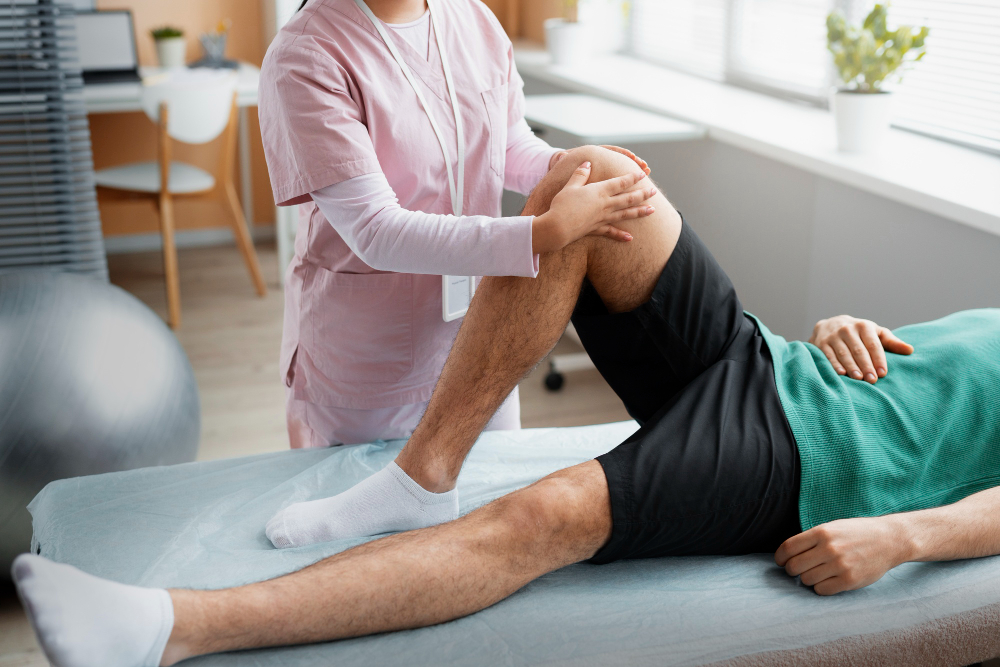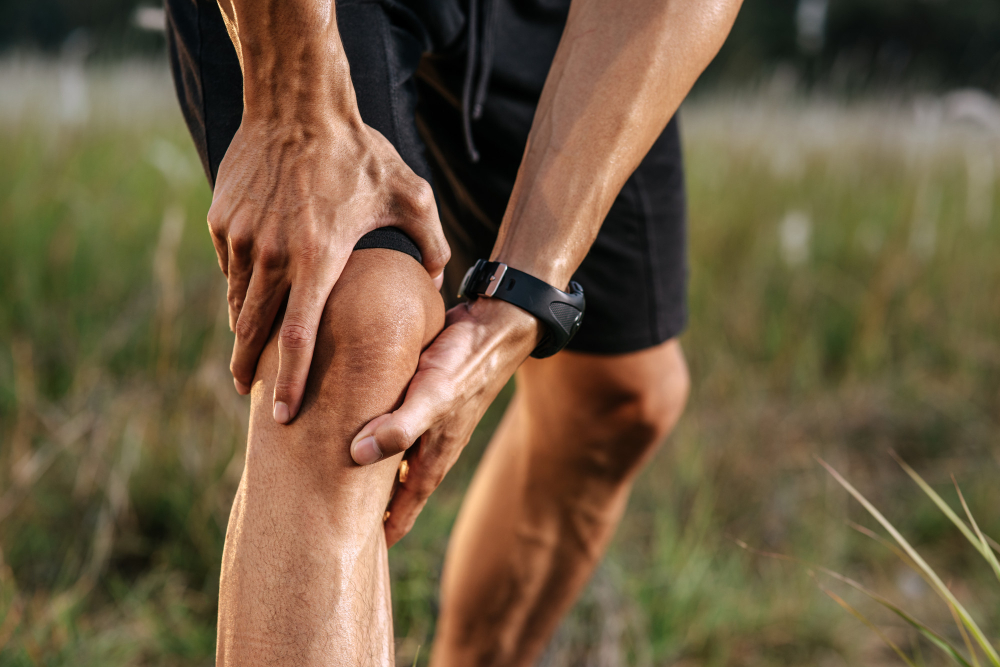Physical well-being plays a vital role in maintaining a healthy and fulfilling love life. Unfortunately, chronic conditions such as knee pain and back pain can significantly interfere with your ability to engage in activities with your partner, causing stress and frustration in your relationship. These pain issues not only affect your physical capabilities but also influence emotional intimacy, communication, and overall quality of life. In this blog, we’ll explore how knee and back pain can impact relationships and love lives, and provide tips on how to manage these challenges.
Ways Knee Pain and Back Pain Affect Your Relationship and Love Life
Chronic knee and back pain can be debilitating, limiting your ability to participate in physical activities and deeply affecting your bond with your partner. Let's take a closer look at how these issues can disrupt your relationship dynamics:
1. Restrictions on Physical Activities
Knee pain and back pain significantly hinder your ability to perform daily tasks and engage in fun activities with your partner. Things like walking, hiking, dancing, or enjoying spontaneous adventures can become increasingly painful or even impossible. This limitation can lead to feelings of isolation or frustration. Over time, your partner may feel burdened or disconnected, which can result in strain or tension within the relationship. You may also feel left out, unable to participate in the activities you once enjoyed together.
2. Emotional Toll
Chronic pain is not just a physical burden; it also impacts emotional well-being. The frustration and irritability that often accompany constant discomfort can spill over into your relationship, causing mood swings, stress, and sometimes even depression. This emotional turmoil can lead to misunderstandings or a breakdown in communication. The partner experiencing pain may become withdrawn, while the other may struggle to understand the extent of their discomfort. This lack of understanding can create emotional distance between the two of you, affecting intimacy and trust.
3. Intimacy and Sexual Life
When dealing with knee pain or back pain, intimacy and sexual relationships can also suffer. Pain can make certain positions or activities uncomfortable or even impossible, resulting in a decrease in sexual satisfaction. Additionally, chronic pain can erode confidence, leading to a reduced desire for intimacy. Both partners may find themselves frustrated or disconnected due to these physical and emotional barriers. Open, honest communication is key to exploring alternative ways to express love and intimacy during this challenging time.
4. The Need for Support and Understanding
The journey through chronic pain requires patience and understanding from both partners. For the individual in pain, emotional and physical support from their partner is essential for coping. This support may include helping with household chores, offering emotional encouragement, and attending medical appointments together. It’s also important for the non-affected partner to show empathy and be patient, as understanding the limitations and struggles of the person in pain will foster a stronger connection.
5. Seeking Professional Help
Addressing knee and back pain often requires professional treatment. It’s crucial for those affected by chronic pain to consult medical professionals for diagnosis and treatment options. From physical therapy to surgery, there are various ways to manage and reduce pain. Couples may also benefit from counseling, which can help improve communication and provide coping strategies for managing the emotional stress that often comes with chronic pain.
Treatment Options for Knee and Back Pain
There are several treatment options available for knee and back pain, depending on the cause and severity of the condition. Here are some of the most effective options:
1. Medication
Nonsteroidal anti-inflammatory drugs (NSAIDs) can help reduce pain and inflammation associated with knee and back pain. Analgesics or painkillers may also be prescribed to manage discomfort.
2. Physical Therapy
A physical therapist can develop a personalized exercise program to strengthen the muscles around the knee and back, improve flexibility, and enhance joint stability. Physical therapy helps to reduce pain, improve mobility, and enable patients to engage in physical activities again.
3. Lifestyle Changes
Making simple lifestyle modifications, like maintaining a healthy weight, improving posture, and practicing proper body mechanics, can greatly alleviate the stress on your knees and back. Low-impact exercises such as swimming or cycling can also help reduce pain.
4. Assistive Devices
Using knee braces, sleeves, or orthotic inserts can offer additional support for knee pain. For back pain, supportive pillows, ergonomic chairs, and back braces can provide relief and improve comfort.
5. Injections
Corticosteroid injections can help reduce inflammation and pain, while hyaluronic acid injections may improve joint lubrication, especially for knee pain.
6. Surgery
In cases where conservative treatments are ineffective, surgery may be necessary. For knee pain, procedures like knee arthroscopy or total knee replacement may be considered. For back pain, surgeries such as spinal fusion, discectomy, or laminectomy might be required.
7. Alternative Therapies
Complementary therapies such as acupuncture, chiropractic care, or massage therapy may provide additional relief, helping patients manage pain and improve overall wellness.
Dr. Amit Srivastava: The Best Orthopedic Specialist for Knee and Back Pain Treatment in Delhi
If you’re dealing with persistent knee or back pain that’s affecting your relationships and quality of life, look no further than Dr. Amit Srivastava. He is a leading orthopedic doctor in Delhi, specializing in the diagnosis and treatment of knee and back pain. With his extensive experience and compassionate approach, Dr. Srivastava helps his patients find lasting relief and improve their mobility.
Comprehensive Evaluation and Diagnosis
Dr. Srivastava takes a personalized approach to patient care. He conducts thorough evaluations to diagnose the root cause of your knee or back pain, using advanced diagnostic tools and imaging studies. This ensures an accurate diagnosis and an effective treatment plan.
Treatment Options
Dr. Srivastava offers a variety of conservative treatments, including physical therapy, medication, and lifestyle changes, to help manage pain. When necessary, he is also skilled in performing minimally invasive surgeries for knee and back issues.
Compassionate Care and Patient Education
Dr. Srivastava is committed to providing compassionate care and ensuring that his patients feel supported throughout their treatment journey. He educates patients about their conditions and treatment options, empowering them to actively participate in their recovery process.
Surgical Expertise
When surgery is required, Dr. Srivastava uses advanced techniques to perform knee and spine surgeries with precision and care. His goal is always to provide the best possible outcome with minimal recovery time.
Multidisciplinary Approach
Working with a team of specialists, Dr. Srivastava takes a collaborative approach to treatment, ensuring that his patients receive holistic care for lasting pain relief.
FAQs about Knee and Back Pain Treatment
1. How can knee pain affect my relationship?
Knee pain can limit your ability to participate in physical activities with your partner, leading to frustration, isolation, and emotional strain. It can also impact intimacy, as certain positions may become uncomfortable.
2. Can back pain affect intimacy?
Yes, back pain can limit movement and flexibility, making sexual activity painful or difficult. It can also reduce confidence and decrease the desire for intimacy, leading to frustration for both partners.
3. What are some treatment options for knee and back pain?
Treatment options include medications, physical therapy, lifestyle changes, assistive devices, injections, and in severe cases, surgery. Your healthcare provider will recommend the best treatment for your specific condition.
4. How long does it take to recover from knee or back surgery?
Recovery time varies depending on the severity of the surgery, but it typically ranges from a few weeks to several months. Physical therapy plays a key role in speeding up recovery and regaining mobility.
5. How can we maintain intimacy despite chronic pain?
Open communication is essential. Explore alternative ways to be intimate, such as holding hands, cuddling, or other non-sexual expressions of love. Work together as a team to overcome challenges, and consider seeking professional advice to improve your relationship.
Conclusion
Knee and back pain can significantly impact relationships, but with the right support and treatment, you can maintain a strong and fulfilling connection with your partner. By addressing the pain through medical intervention, lifestyle changes, and emotional support, couples can work through these challenges and strengthen their bond. Don’t let chronic pain dictate your life or love—take the first step toward a pain-free existence today with Dr. Amit Srivastava.





